|
|
|
Sort Order |
|
|
|
Items / Page
|
|
|
|
|
|
|
| Srl | Item |
| 1 |
ID:
120011


|
|
|
|
|
| Publication |
2013.
|
| Summary/Abstract |
This article explores symbolic boundaries and identity-formation of the 'ethnonational Us', using narrative analysis of eleven Israeli-Jewish dissidents. The hegemonic nationalist discourse in Israel - Zionism - constructs the dissidents' identities as the 'Virtuous Us', yet these individuals genuinely try to connect with the 'Demonized Palestinian Other'. I suggest that the dissidents attempt to use alternative national identity discourses to overcome symbolic boundaries. I highlight inconsistencies within individual dissidents' narratives and attribute them to the employment of multiple discourses, suggesting that some discourses fail to coherently reconcile 'national' history with the well-being of the Other, whilst others repel dissidents by appearing to negate or destroy their identities. The dissidents, therefore, cannot use the available discourses to fully overcome symbolic boundaries. Only the hegemonic nationalist discourse can offer a self-evident and compelling enunciation of the dissidents' political reality, leading one insightful dissident to conclude that there is 'no way out' of his dilemma.
|
|
|
|
|
|
|
|
|
|
|
|
|
|
|
|
| 2 |
ID:
116229
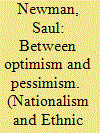

|
|
|
|
|
| Publication |
2012.
|
| Summary/Abstract |
The Oslo Accords failed to end Israeli-Palestinian violence and led to a final settlement of the conflict. This article examines Israeli attitudes toward conflict resolution and argues that the peace process, despite its setbacks, has increased Israeli support for certain concessions. While support for the "Oslo Process" may have declined, Jewish Israeli acceptance of the creation of a Palestinian state has risen dramatically. Israelis remain committed to continuing the peace process, they just remain highly skeptical that the process will succeed. The article examines the sources of this skepticism. Both lack of trust in Arab aspirations and religiosity are the primary determinants of Israeli unwillingness to make concessions for peace. Trust is tied to present conditions rather than past conditions of conflict. Thus, if trust could be rebuilt, Israeli Jews would be considerably better poised to make political and territorial concessions for peace than they were at the start of the "Oslo Process." Although the relative fertility rates of Orthodox Jews, compared to secular Jews, might undermine long-term support for peace, this might be counterbalanced by the growing dovishness of young secular Russians socialized in Israel.
|
|
|
|
|
|
|
|
|
|
|
|
|
|
|
|
| 3 |
ID:
094430
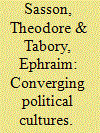

|
|
|
|
|
| Publication |
2010.
|
| Summary/Abstract |
We examine the impact of globalization on Israeli and American Jews' attitudes regarding religious pluralism and minority civil rights in Israel. Studying middle-class Israeli and American Jews of European descent, we find overlap across (and differentiation within) the groups. We attribute political cultural convergence to globalization: (1) international travel; (2) diffusion of Jewish transnational institutions; (3) increased integration of Israel into global capitalist relations; and (4) perceived security threats moving American Jews toward increased security concerns for themselves and Israel. We perceive new patterns of transnational engagement in which Israeli and American Jews seek common cause with their like-minded counterparts.
|
|
|
|
|
|
|
|
|
|
|
|
|
|
|
|
| 4 |
ID:
119475
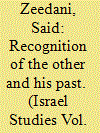

|
|
|
|
|
| Publication |
2013.
|
| Summary/Abstract |
I t is unfortunate that both P alestinian A rabs and I sraeli J ews are still stuck in the past, trapped in it, unable to be free from its yoke, unable to overcome or transcend or supersede it. Both utilize and mobilize the past, or their respective construal of it, in order to rationalize, justify and support their competing claims, rights, complaints, narratives, policies and actions in response to current events.
The past is never allowed to lay in rest. Since the turn of the 20th century, more obviously since the traumatic events in 1948, this tormenting past has never ceased to hover over the horizons of Palestine/Israel. It is a merciless and ruthless past indeed. The more one broods upon this past, thus used and abused, the less one is inclined to recognize the other, his rights and his past, especially in times of bloodshed and in times of intense suffering.
|
|
|
|
|
|
|
|
|
|
|
|
|
|
|
|
| 5 |
ID:
128169
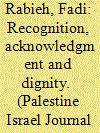

|
|
|
|
|
| Publication |
2012.
|
| Summary/Abstract |
We have no choice but to learn how to coexist and share this land; we cannot defeat each other militarily and that each nation is here to stay.
|
|
|
|
|
|
|
|
|
|
|
|
|
|
|
|
| 6 |
ID:
140168


|
|
|
|
|
| Summary/Abstract |
Somewhat paradoxically, numerous scholars in various disciplines have found that religion induces negative attitudes towards immigrants, while others find that it fuels feelings of compassion. We offer a framework that accounts for this discrepancy. Using two priming experiments conducted among American Catholics, Turkish Muslims, and Israeli Jews, we disentangle the role of religious social identity and religious belief, and differentiate among types of immigrants based on their ethnic and religious similarity to, or difference from, members of the host society. We find that religious social identity increases opposition to immigrants who are dissimilar to in-group members in religion or ethnicity, while religious belief engenders welcoming attitudes toward immigrants of the same religion and ethnicity, particularly among the less conservative devout. These results suggest that different elements of the religious experience exert distinct and even contrasting effects on immigration attitudes, manifested in both the citizenry's considerations of beliefs and identity and its sensitivity to cues regarding the religion of the target group.
|
|
|
|
|
|
|
|
|
|
|
|
|
|
|
|
| 7 |
ID:
090138
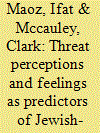

|
|
|
|
|
| Publication |
2009.
|
| Summary/Abstract |
A representative sample of Israeli Jews (N = 504) completed a survey assessing attitudes towards compromise in the Israeli-Palestinian conflict. Support for compromise was well predicted (R = .63) by a combination of four scales: perception of collective threat from Palestinians, perception of zero-sum relations between Palestinians and Israelis, personal fear of Palestinians, and sympathy towards Palestinians. Feelings of hostility towards Palestinians did not make an independent contribution to this prediction. As hypothesized, respondents who perceived high collective threat and zero-sum relations were much less supportive of making concessions to Palestinians. However, respondents who indicated feeling personal fear were in regression analysis slightly more supportive of compromise. Sympathy toward Palestinians was associated with more support for compromise. Additionally, religiosity was strongly associated with decreased support for compromise. However, entering threat perceptions and sympathy into the equation substantially reduced the predictive value of religiosity, indicating that psychological mechanisms underlie, at least in part, the tendency of more religious respondents to show less support for making concessions to Palestinians.
|
|
|
|
|
|
|
|
|
|
|
|
|
|
|
|
|
|
|
|
|